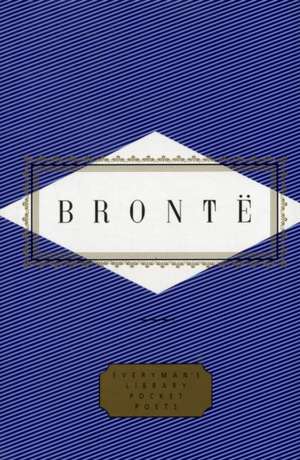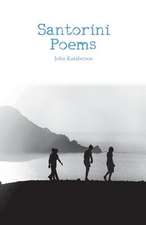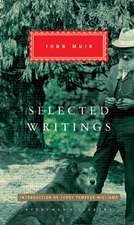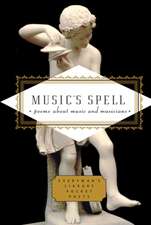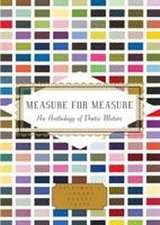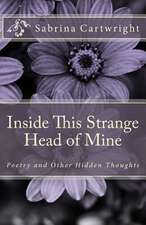Bronte Poems: Everyman's Library POCKET POETS
Autor Emily Bronteen Limba Engleză Hardback – 24 apr 1996
| Toate formatele și edițiile | Preț | Express |
|---|---|---|
| Hardback (2) | 76.15 lei 3-5 săpt. | +10.40 lei 7-13 zile |
| EVERYMAN – 24 apr 1996 | 76.15 lei 3-5 săpt. | +10.40 lei 7-13 zile |
| Everyman's Library – 31 mar 1996 | 105.38 lei 3-5 săpt. |
Din seria Everyman's Library POCKET POETS
- 17%
 Preț: 57.90 lei
Preț: 57.90 lei - 30%
 Preț: 53.36 lei
Preț: 53.36 lei -
 Preț: 76.13 lei
Preț: 76.13 lei - 16%
 Preț: 58.32 lei
Preț: 58.32 lei - 16%
 Preț: 53.42 lei
Preț: 53.42 lei -
 Preț: 63.36 lei
Preț: 63.36 lei - 17%
 Preț: 63.33 lei
Preț: 63.33 lei - 16%
 Preț: 53.55 lei
Preț: 53.55 lei - 16%
 Preț: 53.74 lei
Preț: 53.74 lei - 16%
 Preț: 58.53 lei
Preț: 58.53 lei - 17%
 Preț: 63.29 lei
Preț: 63.29 lei - 16%
 Preț: 53.42 lei
Preț: 53.42 lei - 16%
 Preț: 53.53 lei
Preț: 53.53 lei - 16%
 Preț: 53.91 lei
Preț: 53.91 lei - 23%
 Preț: 58.34 lei
Preț: 58.34 lei - 17%
 Preț: 63.36 lei
Preț: 63.36 lei - 16%
 Preț: 53.47 lei
Preț: 53.47 lei - 16%
 Preț: 63.71 lei
Preț: 63.71 lei - 17%
 Preț: 63.05 lei
Preț: 63.05 lei - 17%
 Preț: 63.33 lei
Preț: 63.33 lei - 16%
 Preț: 53.96 lei
Preț: 53.96 lei - 16%
 Preț: 53.50 lei
Preț: 53.50 lei - 17%
 Preț: 63.37 lei
Preț: 63.37 lei - 30%
 Preț: 53.37 lei
Preț: 53.37 lei - 16%
 Preț: 63.51 lei
Preț: 63.51 lei - 16%
 Preț: 58.60 lei
Preț: 58.60 lei - 16%
 Preț: 58.25 lei
Preț: 58.25 lei - 17%
 Preț: 62.74 lei
Preț: 62.74 lei - 16%
 Preț: 63.46 lei
Preț: 63.46 lei - 16%
 Preț: 58.40 lei
Preț: 58.40 lei - 16%
 Preț: 63.81 lei
Preț: 63.81 lei - 16%
 Preț: 53.55 lei
Preț: 53.55 lei - 16%
 Preț: 58.34 lei
Preț: 58.34 lei - 16%
 Preț: 58.37 lei
Preț: 58.37 lei - 16%
 Preț: 58.56 lei
Preț: 58.56 lei - 16%
 Preț: 53.52 lei
Preț: 53.52 lei - 16%
 Preț: 58.59 lei
Preț: 58.59 lei - 17%
 Preț: 63.40 lei
Preț: 63.40 lei - 17%
 Preț: 63.37 lei
Preț: 63.37 lei - 16%
 Preț: 53.52 lei
Preț: 53.52 lei - 16%
 Preț: 58.53 lei
Preț: 58.53 lei - 17%
 Preț: 63.24 lei
Preț: 63.24 lei - 16%
 Preț: 63.71 lei
Preț: 63.71 lei - 16%
 Preț: 53.47 lei
Preț: 53.47 lei - 17%
 Preț: 63.23 lei
Preț: 63.23 lei - 16%
 Preț: 53.43 lei
Preț: 53.43 lei - 16%
 Preț: 63.43 lei
Preț: 63.43 lei - 16%
 Preț: 53.42 lei
Preț: 53.42 lei - 16%
 Preț: 53.59 lei
Preț: 53.59 lei - 16%
 Preț: 58.28 lei
Preț: 58.28 lei
Preț: 76.15 lei
Nou
Puncte Express: 114
Preț estimativ în valută:
14.57€ • 15.88$ • 12.28£
14.57€ • 15.88$ • 12.28£
Carte disponibilă
Livrare economică 02-16 aprilie
Livrare express 19-25 martie pentru 20.39 lei
Preluare comenzi: 021 569.72.76
Specificații
ISBN-13: 9781857157284
ISBN-10: 1857157281
Pagini: 256
Dimensiuni: 113 x 167 x 24 mm
Greutate: 0.25 kg
Editura: EVERYMAN
Seria Everyman's Library POCKET POETS
Locul publicării:United Kingdom
ISBN-10: 1857157281
Pagini: 256
Dimensiuni: 113 x 167 x 24 mm
Greutate: 0.25 kg
Editura: EVERYMAN
Seria Everyman's Library POCKET POETS
Locul publicării:United Kingdom
Notă biografică
Emily Jane Brontë was the most solitary member of a unique, tightly-knit, English provincial family. Born in 1818, she shared the parsonage of the town of Haworth, Yorkshire, with her older sister, Charlotte, her brother, Branwell, her younger sister, Anne, and her father, The Reverend Patrick Brontë. All five were poets and writers; all but Branwell would publish at least one book.
Fantasy was the Brontë children's one relief from the rigors of religion and the bleakness of life in an impoverished region. They invented a series of imaginary kingdoms and constructed a whole library of journals, stories, poems, and plays around their inhabitants. Emily's special province was a kingdom she called Gondal, whose romantic heroes and exiles owed much to the poems of Byron.
Brief stays at several boarding schools were the sum of her experiences outside Haworth until 1842, when she entered a school in Brussels with her sister Charlotte. After a year of study and teaching there, they felt qualified to announce the opening of a school in their own home, but could not attract a single pupil.
In 1845 Charlotte Brontë came across a manuscript volume of her sister's poems. She knew at once, she later wrote, that they were “not at all like poetry women generally write…they had a peculiar music-wild, melancholy, and elevating.” At her sister's urging, Emily's poems, along with Anne's and Charlotte's, were published pseudonymously in 1846. An almost complete silence greeted this volume, but the three sisters, buoyed by the fact of publication, immediately began to write novels. Emily's effort was Wuthering Heights; appearing in 1847 it was treated at first as a lesser work by Charlotte, whose Jane Eyre had already been published to great acclaim. Emily Brontë's name did not emerge from behind her pseudonym of Ellis Bell until the second edition of her novel appeared in 1850.
Fantasy was the Brontë children's one relief from the rigors of religion and the bleakness of life in an impoverished region. They invented a series of imaginary kingdoms and constructed a whole library of journals, stories, poems, and plays around their inhabitants. Emily's special province was a kingdom she called Gondal, whose romantic heroes and exiles owed much to the poems of Byron.
Brief stays at several boarding schools were the sum of her experiences outside Haworth until 1842, when she entered a school in Brussels with her sister Charlotte. After a year of study and teaching there, they felt qualified to announce the opening of a school in their own home, but could not attract a single pupil.
In 1845 Charlotte Brontë came across a manuscript volume of her sister's poems. She knew at once, she later wrote, that they were “not at all like poetry women generally write…they had a peculiar music-wild, melancholy, and elevating.” At her sister's urging, Emily's poems, along with Anne's and Charlotte's, were published pseudonymously in 1846. An almost complete silence greeted this volume, but the three sisters, buoyed by the fact of publication, immediately began to write novels. Emily's effort was Wuthering Heights; appearing in 1847 it was treated at first as a lesser work by Charlotte, whose Jane Eyre had already been published to great acclaim. Emily Brontë's name did not emerge from behind her pseudonym of Ellis Bell until the second edition of her novel appeared in 1850.
Textul de pe ultima copertă
As in her novel Wuthering Heights, Emily Bronte (1818-1848) united in her poems a sensibility elemental in its force with an imaginative discipline and flexibility of the highest order. This most gifted and most enigmatic sister of the now almost mythic Bronte clan wrote poems that are so arresting in their dramatic situations, in the deep strangeness of their psychology, and in the expert musicality of their versification, that she has come over time to be acknowledged among the finest poets in our language.
